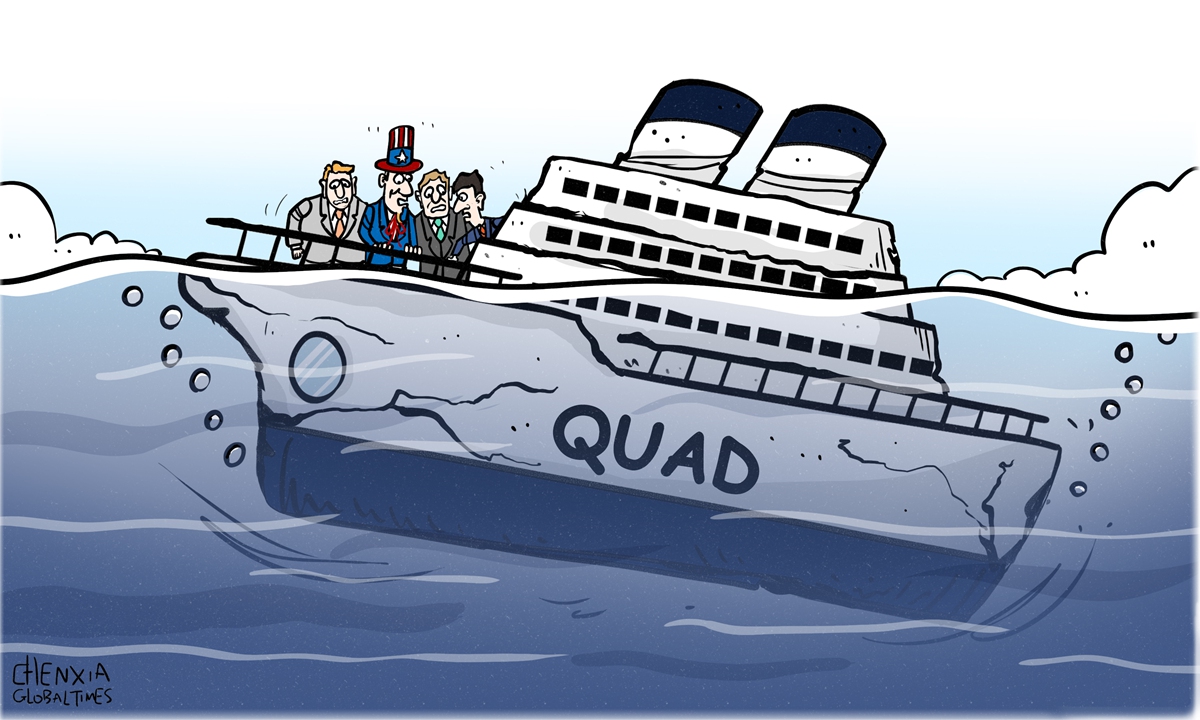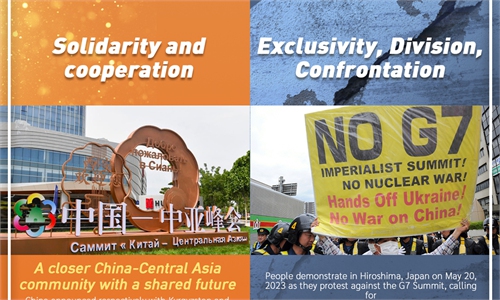
Illustration: Chen Xia/GT
The leaders of the Quad, officially the Quadrilateral Security Dialogue including the US, Australia, India and Japan, met in Japan's Hiroshima on Saturday. It was a replacement of the Sydney summit which was originally set to be held on May 24 but was called off by the US. In the end, it became merely an episode of the G7 summit this year, which mirrors the limited efficiency and significance of the Quad.The Quad Leaders' Joint Statement, issued on Saturday, did not name China directly. But Western media widely believed that the content of the statement is full of insinuations about the "China threat" theory. It claims "we strongly oppose destabilising or unilateral actions that seek to change the status quo by force or coercion," and "we express serious concern at the militarisation of disputed features, the dangerous use of coastguard and maritime militia vessels, and efforts to disrupt other countries' offshore resource exploitation activities." These are merely excuses for the US, ganging up with Japan, India and Australia, to further interfere in the South China Sea affairs.
The long-term goal of the Quad is to incorporate various forms of confrontation against China via increasing military cooperation. It has been described as the "Asian version" of NATO, which is in line with Washington's wild ambitions. However, ignoring the fact that the Quad countries have different positions on China, so their national interests require different strategies toward China, as well as the fact that no country in Asia is willing to confront China strategically in a tit-for-tat way, it is difficult to convince other regional countries that this mechanism revolving around China will bring cooperation and development they have desired. This makes the Quad lack the inner driving force. When the White House claimed that "there are no plans for new members at this time," the reality is that the US lacks confidence in expansion and is unwilling to invest excessive resources. The cancellation of the Sydney summit this time is a result of Joe Biden's careful calculation based on both domestic and international situations.
The direct cause for the cancellation of the Sydney summit is the US domestic debt ceiling crisis. Biden and House Speaker Kevin McCarthy had planned to meet again on Monday, as the clock ticks toward a possible government default next month. Biden has blamed the Republicans for being unwilling to entertain the idea of closing the federal budget deficit by raising taxes on the wealthy. In recent years, political polarization in the US has intensified sharply, and the Democrats and the Republicans have engaged in relentless attacks on each other for partisan interests, which has become a widespread phenomenon, which, in the end, is having an impact on international affairs traditionally led by the US.
Biden may believe that a trip to South Pacific, becoming the first sitting US president to visit Papua New Guinea, and attending the Summit of the Forum for India-Pacific Islands Cooperation and the US-Pacific Island Forum meeting, is not that important; as for the Quad Leaders' Summit in Sydney, it could simply change location and time.
With the rapid development of emerging countries and the relative decline of the US, the US is turning from being the leader of international affairs and the sole superpower to becoming a coordinator of international affairs and an ordinary major power. Therefore, its ability to intervene in international affairs has become increasingly limited. The Russia-Ukraine conflict is the No.1 international concern for the US. In February, reports show that the US Congress had committed more than $113 billion in support for Ukraine in 2022 alone. This undoubtedly affects US commitment and attention to other international affairs. It is difficult for the US to refuse to participate in the G7 summit, but diplomatic activities related to the South Pacific region and meetings related to its "Indo-Pacific Strategy" can be set aside.
The US has always regarded itself as the "city upon the hill," a role model to the world. But the US is now facing many problems and is not a role model any more in many aspects; instead, it has become a "problem" for the world. This basic reality tells people that anyone who wants to isolate China in the region will end up isolating itself and being isolated.
The author is director of the Department of International Strategy at the Institute of World Economics and Politics under the Chinese Academy of Social Sciences. opinion@globaltimes.com.cn



